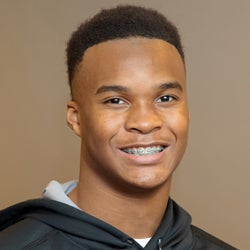Cardiac Arrest
It was supposed to be a day like any other as Kenan Jones prepared for summer football practice at his school. It was second nature, something he had done many times before. But as practice wound down, Kenan went into full cardiac arrest. “I got a phone call not long before the practice was over,” recalls Kenan’s mother, Felicia, who also works at Kenan’s school. “They told me Kenan had passed out. I thought he was just dehydrated or something like that, but when I got out there, I realized Kenan wasn’t breathing.” Kenan’s coach and a fellow teammate performed CPR until first responders arrived. After two shocks from an automated electronic defibrillator (AED), Kenan’s heart started beating again, but he didn’t wake up. He was intubated and rushed to the nearest hospital. “At that point, we still didn’t know if it was a seizure or if he choked on something or what it was,” Felicia said. “We later found out Kenan had gone into cardiac arrest.” Doctors agreed Kenan’s best option for treatment was at Children’s of Alabama. Kenan traveled by helicopter from Huntsville to Birmingham in the care of Children’s Critical Care Transport team. “Up until this point, it was a whirlwind,” Felicia said. “I knew my 14-year-old son pretty much died on the field and was revived. My whole world was just turned upside down. But when we got to Children’s, as bad as it was, I never felt more comfortable and at peace. It looked like action was taking place and they were going to take care of my baby.” In addition to taking care of Kenan, the staff also took care of Kenan’s family, including his 11-year-old sister Mikayla. Children’s staff brought Mikayla coloring books and played and talked with her through the ordeal. “They understood what my husband, Kenyatta, and I were going through,” Felicia said. “It really showed me that they cared about the whole family. It was so reassuring.” For almost two days, Kenan was in a medically-induced coma. Numerous tests were performed and the results all came back normal. “The cardiologists explained that we may never know why this happened, but they did everything imaginable to try to figure out it,” Felicia said. The family also celebrated some good news – Kenan did not suffer any heart or brain damage from the cardiac arrest. “Doctors said that he was a miracle,” Felicia says. “They told us that less than five percent of people survive cardiac arrest. We knew that God is not done with Kenan yet. He’s got a plan for him.” As a preventive measure, however, doctors suggested implanting a subcutaneous implantable cardioverter defibrillator (S-ICD), a battery-powered device placed under the skin to monitor heart rhythm and detect irregular heartbeats. The S-ICD would get Kenan’s heart back in normal rhythm if he ever had another cardiac arrest. The family proceeded with the surgery and thus far Kenan has not had any episodes. He visits Children’s every six months for regular check-ups and he’s gotten the green light to play baseball this year, the first time he’s been cleared to return sport. “We have such an appreciation for Children’s,” Felicia said. “When you go through something as traumatic as this, you need comfort, and Children’s was there for us. They took care of Kenan and they took care of us, too. We are so thankful for what Children’s did for us.”







